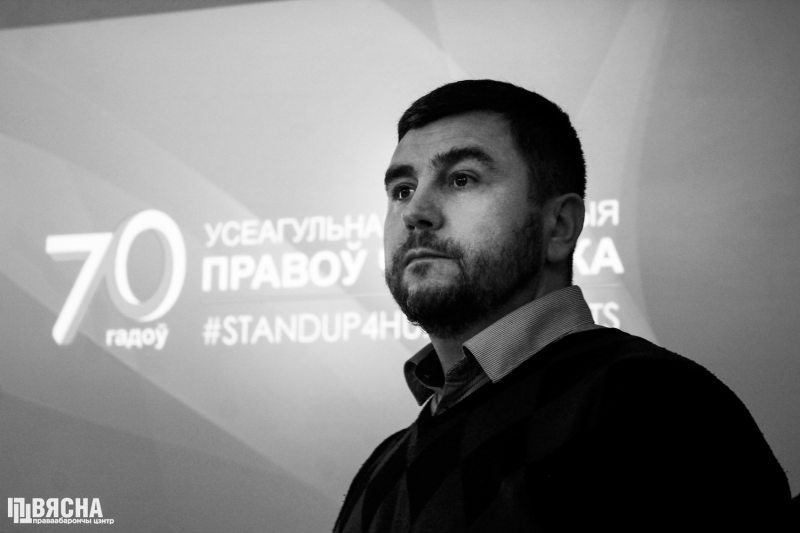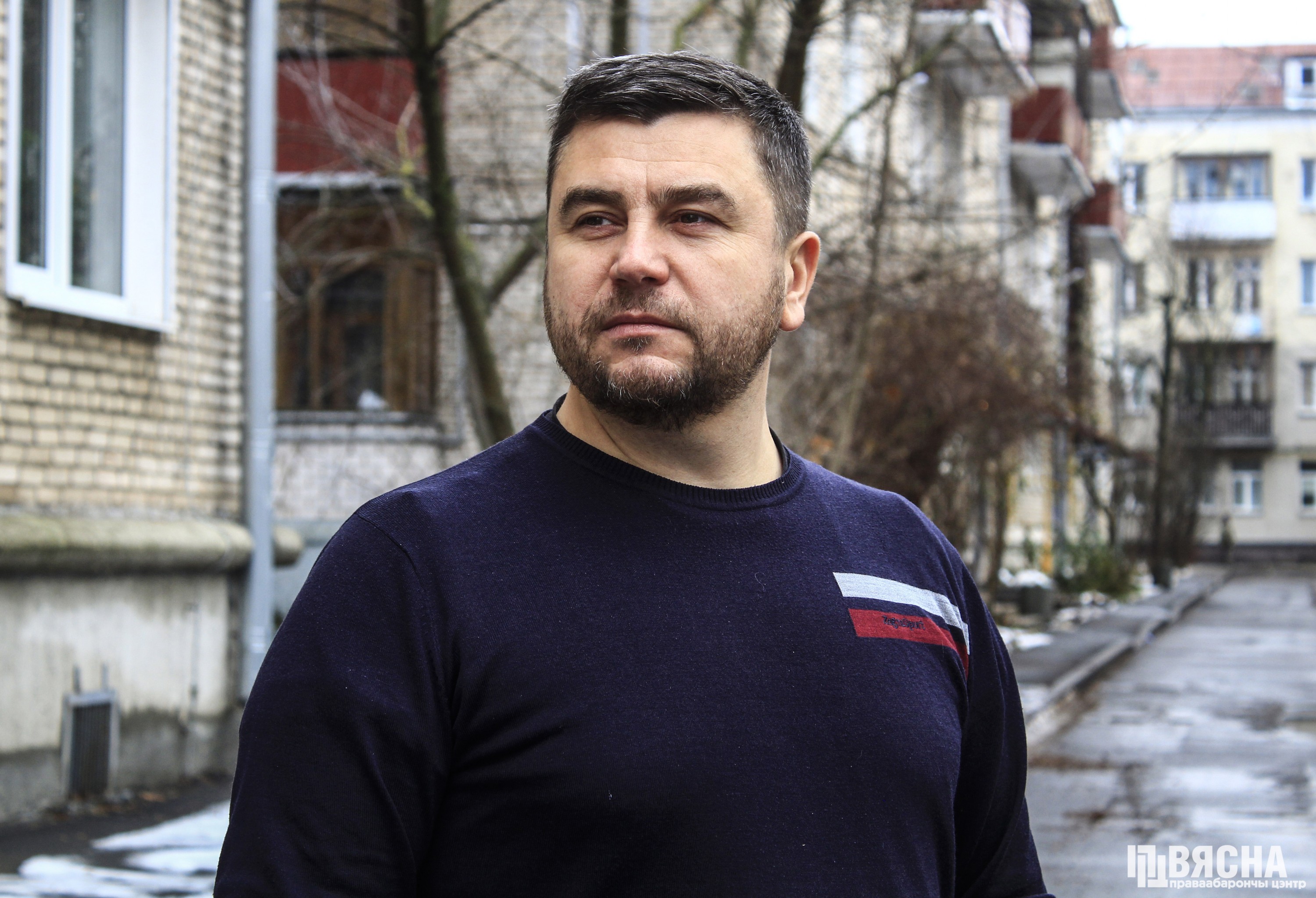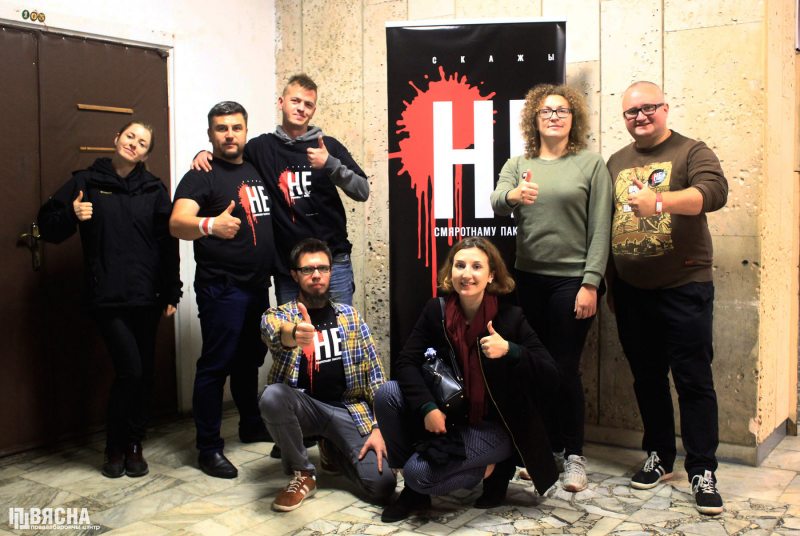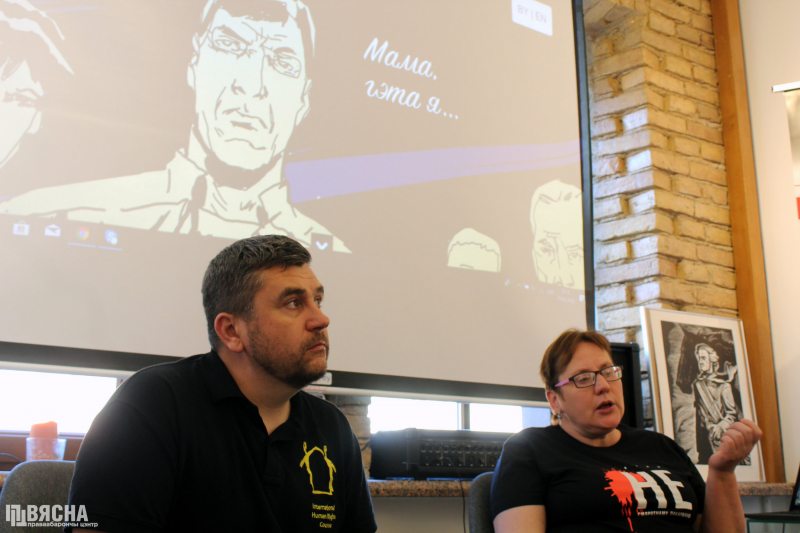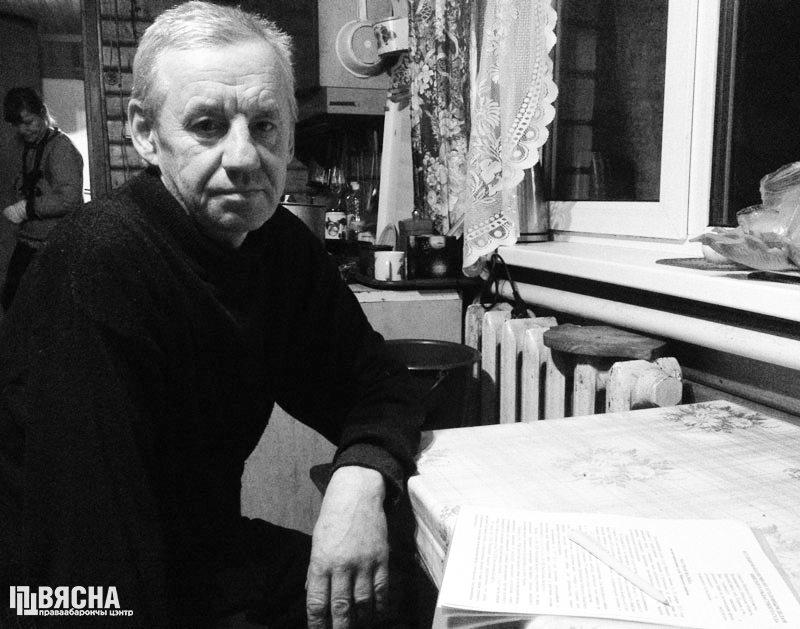Andrei Paluda: Abolition of the death penalty is what every Belarusian needs
Belarus is the only country in Europe and among post-Soviet states that stills executes people. The people here are killed by shooting in the back of the head. Despite the widely recognized fact that the death penalty does not work as a deterrent and is an apparent vestige of the Middle Ages, the conveyor of death continues to operate, while the veil of secrecy and the inhuman treatment to the families of death row prisoners are reminiscent of the Stalin-era repression.
This year, human rights activist Andrei Paluda will mark 10 years since he took over the campaign against the death penalty in Belarus. A former police officer, now he and his associates are working hard to make people talk about the uneasy topic and to encourage the authorities to introduce a moratorium on the barbaric punishment.
Belarusian Partisan interviewed the activist working with the Human Rights Center “Viasna” to try to find an answer to the question of why the abolition of the death penalty is necessary to every Belarusian.
“I can still remember the feeling of freedom in the air. It’s been with me since then”
- Andrei, you used to be a police officer, a graduate of the Police Academy. Did it affect you in some way, your character or attitude?
- In any job, a person faces professional deformation, it is natural. For example, I can see it well in my mother, who worked for several decades as a school teacher, and she still talks with my younger brother, who is in his late 30s, as if he’s her student. In a way, work with the police also influenced me as I often use the knowledge and experience in my human rights activities. This allows a certain degree of understanding of police officers, because I was once in the system, and it helps me be not so judgemental. I will never say “They are all the same,” and it is not only about the police. People are all different.
- How did you come to quit the police and become a human rights defender?
- There was a time when I experienced a personal evolution. I used to be a person who had no issue with the death penalty and considered it to be normal. And today I am coordinating the campaign against the death penalty. If you go to a place where you get legal knowledge with an accusatory approach, it is extremely difficult to favor other values. I came to these beliefs through national and patriotic values, through the Belarusian language and culture.
The time had its effect, too. Back in 1993, I left high school and immediately went to the Police Academy. Those were the “dashing 90s”. Everything seemed so different. I was so boyish, it seemed to me that work with the police was one of the good ways to help establish justice. It was a conscious choice, in so far as one can say that about a 17-year-old.
An important fact was that I had time to make a few sips of the short-lived freedom. I can still remember the feeling of freedom in the air. It’s been with me since then. Working with the police, I had to deal with the people from the opposition. And today I am grateful to these people for finding them, for sharing the same views, values and interests. It all began with a joint celebration of Kupala Night, we listened to folk music, went to concerts. I remember the day after one such concert in Mahilioŭ I took singer Viktar Shalkevich in a police car to the highway, and there I was standing in my police uniform hitchhiking so that he could go to Minsk.
But times were changing. And approaches, too. And I found it increasingly hard to work in the police. At some point, it became totally inconsistent with my beliefs. They threatened to fire me if I didn’t stop my contacts with the BPF and the opposition. And when I myself decided to quit, they didn’t want to let me go. Apparently, they did it to control me. I wrote a resignation report days before promoting to major. But it no longer had any value to me.
I was engaged in activism within the patriotic youth movement Zubr. We helped people appeal illegal convictions, prepared parcels when they were in detention. I myself was arrested. But I was increasingly drifting towards human rights activities. I felt it resonated with me. At the same time, I realized that I lacked knowledge.
I applied for a human rights course at the Helsinki Foundation in Warsaw. And I am very grateful that I was admitted, because the course has only been completed by 15 people from Belarus. And all of them are now well-known people in the human rights sector. There, I underwent a certain evolution in terms of human rights, and a certain revolution, too. But it helped me make sense of it all.
In 2007, I started working with the Human Rights Center “Viasna”. We launched our human rights schools. Since then, I have been doing education in the field of human rights. In 2010, I took over the campaign against the death penalty.
“We do not aim to protect the killer. We protect the human being”
- It is believed that the issue of the death penalty is the most difficult topic in the field of human rights. Why is that so?
- The problem of the death penalty is very complex. In my opinion, it is complicated because you know these people are criminals and you cannot change them so that they could integrate into society. There is an understanding that these people committed a crime, they are not angels, but you should still treat them with a human rights-based approach.
We know many cases when the penitentiary system staff changed their attitude to a person after he was sent to death. And although the person can live for up to 18 months, he is already perceived as a waste of space, because they believe that the man is done, he is dead.
In a situation when a person’s fate is fixed, we will still try to help them protect their rights. There are also difficulties in working with the prisoners’ families.
From time to time, we are perceived as the devil’s advocates, but, in fact, we are working to make this world a better place. We do not aim to protect the killer. We protect the human being. In our country, no one cares why these people committed their murders, what went wrong to make this happen. They disclaim responsibility and cut the tumor. This is it. And then a new tumor grows in the same place. And it’s repeated again and again, but no one is trying to understand why this happens and how to fix it.
The topic of torture is also difficult. But the death penalty includes torture, too. It’s inhuman treatment of the families, bans on receiving the bodies and so on.
- Why did you decide to work with the death penalty?
- I did not choose it. Time chose us. I have always had an understanding of the complexity and seriousness of the topic. To a certain extent, my personal landmark was the story of 2005 when several youths were arrested in Bialyničy for the murder of six people, including small children. It was a very difficult case and it could result in death sentences, but it didn’t add up. We were approached by a local activist Barys Vyrvich. He asked to help the defendants’ mothers with writing complaints. This was my first case related to the death penalty. I can’t claim I strongly influenced the case. However, it had a lot of media attention. Then it fell apart in court, and the people charged with murder received short terms, but on completely different charges, like stealing a bike and so on. Last year, the case was reopened and the people are in custody again. We haven’t started working on the case, but we are keeping it in focus.
To some extent, it was a success story: if these people were found guilty, they would have been executed. And just think how many similar cases we have had!
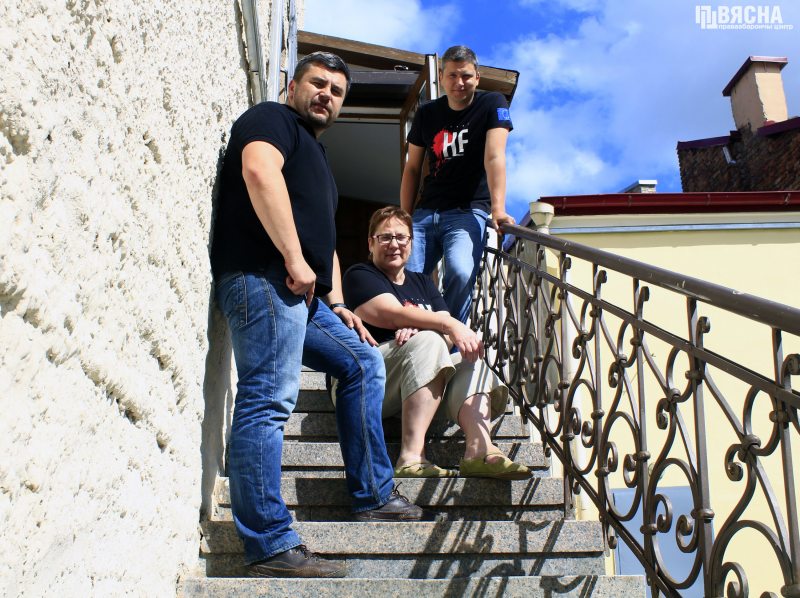
- Andrei Paluda with the campaign activist Palina Stsepanenka and journalist Pavel Mazheika. Hrodna, 2018
- In one interview, you said that working with human rights does not require being a lawyer, and sometimes a degree in Law can be a handicap. Why?
- The schools of Law we have are very specific, often very accusatory. This makes you think in stereotypes, use a cliched approach.
Of course, one should know the basics of Law, but it is more important to understand human rights, rather than know them. Many human rights defenders have never studied Law, but they can be role models for us. Marek Nowicki and Andrei Sakharov are both nuclear physicists. But they could talk about complicated things in simple terms. They contributed greatly to the spread of human rights ideas. Ales Bialiatski, the well-known Belarusian human rights activist, is a philologist. But there are many lawyers who became well-known human rights defenders, too. I think it is important how human rights activists are doing their job, helping people and spreading the ideas of human rights.
- You have spent years working with human rights. Do you have any professional deformation as a human rights activist?
- I do. From time to time, I can feel that I am swinging from one extreme to the other. On the other hand, it is a natural process, because human rights is not a profession, but a way of life. Many things and situations are viewed in terms of human rights. And you start being intolerant to injustice. So, I would call it a positive deformation. This is exactly what we call the understanding of human rights. You do not try to adapt the situation to a legal clause, but proceed from life, instead.
“Belarus is losing a lot of money because of annually killing several people in the name of the state”
- This year, the campaign Human Rights Defenders against the Death Penalty in Belarus will celebrate its 10th anniversary. Its main objective is the abolition of the death penalty in Belarus, and the first step towards it is the introduction of a moratorium on executions. It is clear that this question depends on the political will of one person, but human rights activists continue to work in this direction. It seems rather difficult — beating your head against the wall for a decade. To feel the results of your work, is it possible to eat an elephant one bite at a time or find ways to humanize the death penalty? Ensure that the families could receive the bodies, or at least know where the prisoners are buried? Lift the veil of secrecy surrounding the topic?
- In my opinion, it is extremely difficult to humanize the death penalty, which is inherently inhumane. A moratorium will solve all these issues instantly.
As for the results. We already have tangible results. When we started the campaign, the issue was not in the newspapers and nobody cared. Even before the start of the campaign, 30-40 people were executed every year, and no one talked about it. Supermarket tabloids could write about the executions to terrify passengers traveling on commuter trains. But the cases were not properly analyzed, and the issue was far from being mainstream. Today, the topic of the death penalty receives wide media coverage. It causes discussion and debate, and this is one of the achievements of our campaign. Every death sentence is followed by the international community. There are reactions in Belarus, too, as the situation is monitored by the media, both public and private.
In addition, we are working to increase tolerance and reduce aggression in our society: organizing debates, film screenings, festivals and weeks against the death penalty. It is no secret that the death penalty stirs up hatred, as people begin to see everything through the prism of the fact that the state has the right to kill. And so they do not need any limits at all. This is not only about the death penalty. The boundaries of the permissible are expanding. It is also important to see comments under publications on the topic, as people share their pros and cons. And debate can help society become mature. We have our arguments against the death penalty. And people have their arguments for it. That’s where some new arguments are being born. For example, a well-known IT-businessman Viktar Prakapenya said that the existence of the death penalty and human rights concerns (human rights cannot be fundamentally improved unless the death penalty is abolished) greatly affect economic factors, including the rates of Belarusian Eurobonds, which are mostly rated junk. A moratorium on the death penalty would reduce the cost of servicing the national debt of Belarus. As a result, Belarus is losing a lot of money because of annually killing several people in the name of the state.
This is a good answer to the common argument of why taxpayers should pay for the prisoners’ life sentences. And the answer is not invented by us, but was born in society, which is even more valuable to us. We have the state budget of about $ 15 billion. And about one billion dollars is spent on debt service. We pay exorbitant rates to service our external debt (5-6%). Abolition of the death penalty will reduce the cost of government debt. If we abolish the death penalty, we can save $ 200 million, or even more. So, shooting 5 people costs $ 200 million. It looks like bombing them from aircraft, he said.
“You want a deterrent? So let’s shoot people in central Minsk and show it on TV!”
- How much does it cost to pay for a prisoner’s life sentence?
- I don’t know the exact figures. But one of the activities of our campaign was writing an essay on the death penalty. One guy, a student of Economics wrote an essay in which he calculated the expenses. It turned out that the maintenance of life prisoners is peanuts for the prison system.
A popular argument in the debate on the death penalty refers to Anders Breivik, who killed a lot of people. They say he is in jail in excellent conditions and even complaining. But he lives in these conditions not because he killed, but because they all serve terms in such conditions. Because their prisons and standards of living are very different. And our people mix apples and oranges.
In our country, first-time convicts find themselves in conditions that will never help them reform. An excursion to prison could help correct them. But when they go there and get used to living by the prison code, then they fear nothing.
The death penalty does not work as a deterrent. The death penalty does not deter crimes. If the government wants it to be so, why does it classify executions? You want a deterrent? So let’s shoot people in central Minsk and show it on TV!
Aliaksandr Asipovich is now awaiting execution on death row (for the brutal murder of two girls in Babrujsk). In Viciebsk, a case is heard of the murder of two elderly women. A death sentence is possible. The conveyor of death is still working. It is unlikely that it was someone’s evil plot to execute two people on the eve of the European Games. It’s just their time came. And the sentences were executed. There were cases when prisoners were shot after major conferences with the participation of high-ranking European visitors. This system is very closed, we do not know exactly how it works. We collect information bit by bit. From the families who learn the news from the prisoners’ letters and during visits. The lawyers also tell something. Some information is leaked by officials. And our task is to make it into a single puzzle.
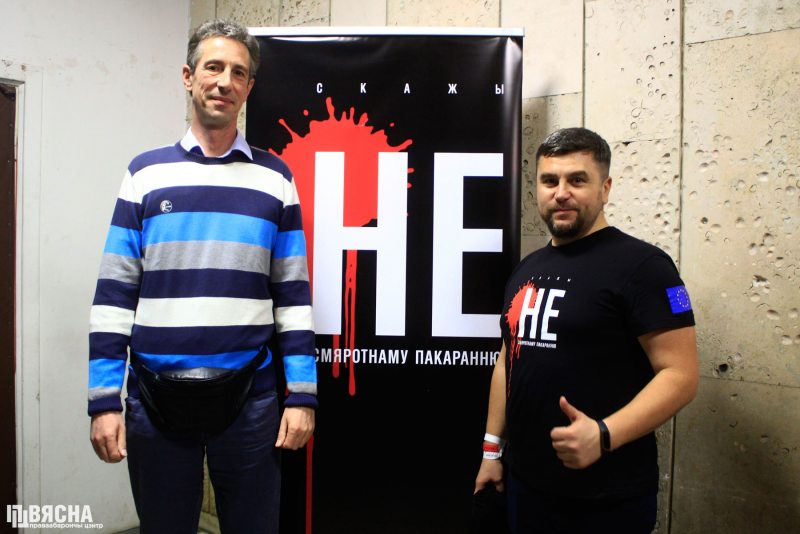
- French Ambassador Didier Canesse and coordinator of the campaign Human Rights Defenders against the Death Penalty in Belarus Andrei Paluda, 2018
- The topic of the death penalty is raised by human rights defenders in the international arena, at the PACE. But is it relevant in Belarus? Online commentators argue that there are more important problems to be solved. Even the topic of abortion is more important than the issue of the death penalty. What do you think about this?
- The problem of the death penalty has always been on the human rights agenda. We appreciate international solidarity, first of all from the EU countries. Belarus says that we are a European country, that we are committed to European values, but they execute two men on the eve of the European Games in Minsk. It was explosive and looks dishonest, to say the least. On the other hand, we can talk a lot about Maslow’s hierarchy of needs, because different people have different priorities. There are people who are only concerned about paying the rent or buying alcohol, while others focus on freedom of religion, or inclusiveness for people with disabilities. And someone treasures most the right to life and freedom from torture.
But I think it’s all pretty much related. There are no more or less important human rights. They are all interconnected. As long as we have the death penalty, as long as our country kills people in the name of the state, we are not part of the Council of Europe and Belarusians cannot seek restoration of their rights in the European Court of Human Rights, one of the most effective human rights protection mechanisms. We travel around the country, talking a lot about the death penalty and what is behind it. When people are informed, they are beginning to understand that the abolition of the death penalty is what they need, rather than the government.
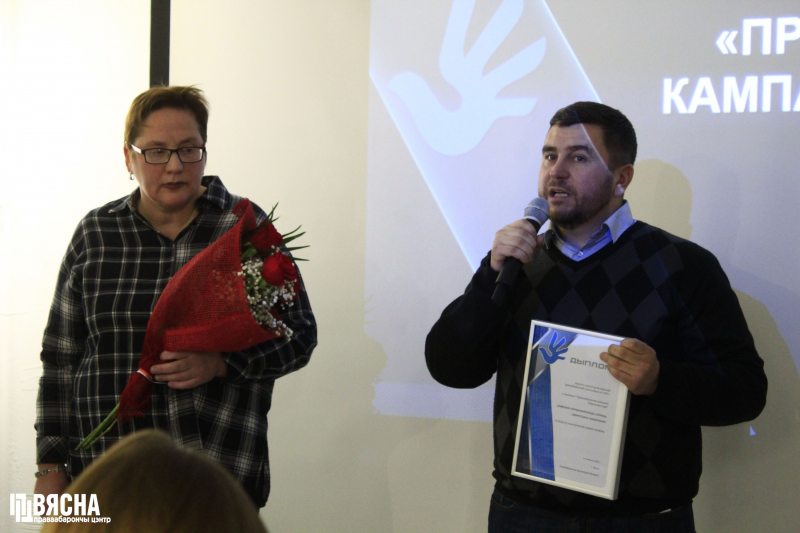
- In 2018, the campaign Human Rights Defenders against the Death Penalty in Belarus received the Campaign of the Year Award
- The veil of secrecy surrounding the death penalty, inhumane treatment of the families — bans on claiming the bodies and knowing the burial place, even the wording used, “departed under the sentence”, — it’s all the sad legacy of the Soviet Union inherited by Belarus. Lukashenka is a man of the Soviet mentality. Maybe he does not support the moratorium, because it’s according to his understanding? In the Soviet Union, people never thought about this issue, the death penalty has always existed as something normal and natural.
- Or maybe he’s never thought it’s the right time? I’m not a psychologist, and I find it difficult to draw a psychological portrait of Aliaksandr Lukashenka, but it seems to me that if the time came, he would abolish the death penalty without any nostalgia. In this sense, he has quite a rational approach.
The fact that we are the only country in the post-Soviet region, which retains the death penalty, makes the question unique and meaningful. And perhaps this is also the reason why the death penalty is retained. If there were several countries with the death penalty, it would be totally different. But in our situation it is a significant asset in the political debate.
Now they are saying about amending the Constitution. I have no idea what it could look like. Will the Belarusian authorities want a true union with Russia?
- Do you admit that the question of the death penalty can be put to a referendum as a carrot for the West against the background of other policy changes?
- Perhaps, the authorities want to carry out some important political changes. And a referendum may include the issue of a moratorium on the death penalty, so that the West could overlook something else.
But we, human rights activists, oppose a referendum on the death penalty. I do not know a single country that abolished the death penalty through a referendum. This question is highly emotional.
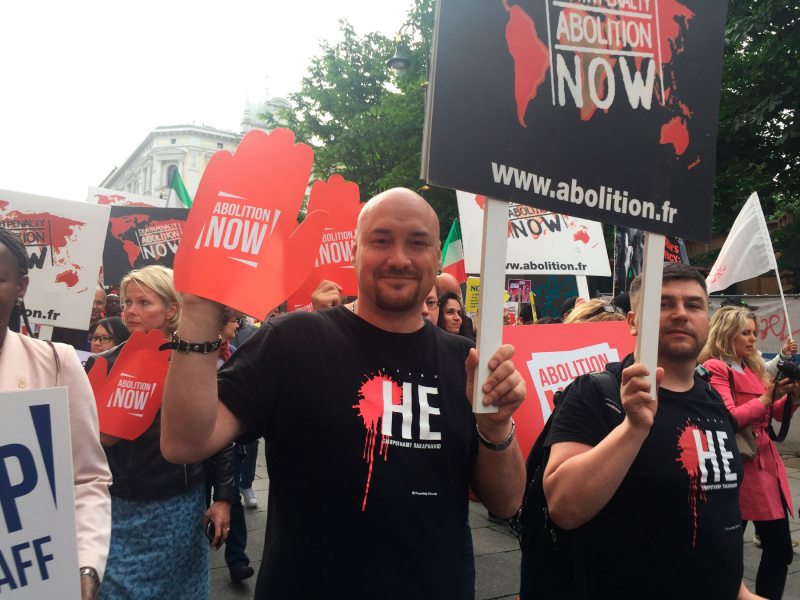
- Valiantsin Stefanovich and Andrei Paluda at the 6th World Congress against the Death Penalty in Oslo. June 23, 2016
- The death penalty is really an emotional topic, in all of its aspects. For example, I used to be emotionally moved by a story of mothers scouring cemeteries in search of the fresh graves of their executed sons (e.g. Sviatlana Zhuk, mother of executed death row prisoner Andrei Zhuk). And which case from your practice impressed you most?
- Each story is unique. For example, I was shocked by a case when Hrunou’s mother received a parcel with her son’s prison uniform before the mail arrived to notify Volha Hrunova of the execution. She gave us the clothes, as a result. In another case, we were the first to learn about the execution of Pavel Sialiun and had to tell the news to his mother. Every case is complex and memorable in its own way.
But I think it was the story of Mikhail Hladki that had the greatest impact on me. He was on the verge of being sentenced to death for the murder of his brother and mother. He then served 8 years and was released after they found the killer.
In June, we learned that he had died. I remember the despair and resentment I felt, the frustration of realizing that this little man was ground by the state machine. It swallowed him, masticated him, and it spat him out. He never received any compensation, although he was found not guilty. This is the question of justice, which he never obtained. We tried to do something, went to court, asked to give him compensation. He did not ask anything beyond measure, he said that he just wanted to pay for a tombstone on the graves of his brother and mother. But he did not live to see this.
A lot has been told about the miscarriage of justice. This man became the living embodiment of a miscarriage of justice in our country. A man who could have been shot in the back of his head, and no one would ever remember him.
Author: Volha Korsun, Belarusian Partisan
Photos: Human Rights Center “Viasna”
